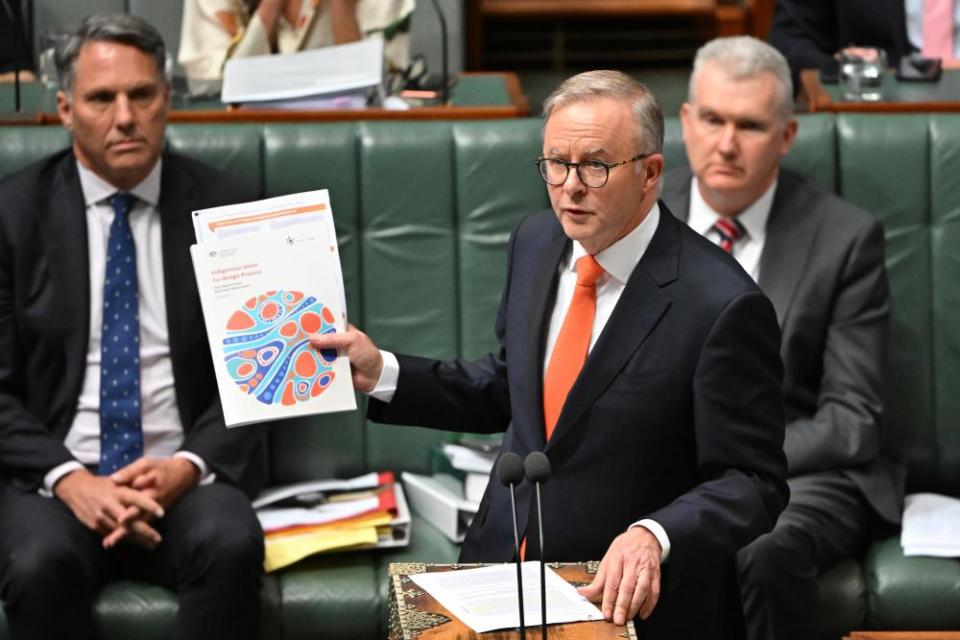State and territory leaders to sign joint statement backing Indigenous voice to parliament

State and territory leaders are expected to formally endorse a plan to support an Indigenous voice to parliament ahead of Friday’s national cabinet meeting.
The leaders of all eight states and territories have committed publicly to backing the voice, but are expected to sign a joint statement at their Council for the Australian Federation meeting on Thursday evening, ahead of national cabinet on Friday.
The move will give a fresh push to the Albanese government’s plans for constitutional recognition through the Indigenous voice advisory body, with the Liberals and Greens yet to agree on their positions.
Related: Lidia Thorpe welcomes sovereignty assurances over voice but remains undecided
The opposition leader, Peter Dutton, will remotely attend the referendum working group on Thursday, along with the shadow attorney general, Julian Leeser, after weeks of hounding the Albanese government for detail on the proposal.
Although Dutton has said he supports constitutional recognition, the Liberal party is yet to formally announce a position on the voice.
The no campaign has indicated it will lobby for a counterproposal in the form of symbolic recognition in the constitution’s preamble, without a voice.
On Wednesday and Thursday the Greens are holding a two-day strategy meeting, which is expected to formalise the party’s position.
Sign up for Guardian Australia’s free morning and afternoon email newsletters for your daily news roundup
Lidia Thorpe, the party’s First Nations spokesperson, has indicated she is opposed unless it is combined with formal recognition of Indigenous sovereignty, although most of the party’s MPs and senators are understood to support the voice.
Thorpe and the Greens leader, Adam Bandt, wrote to the attorney general, Mark Dreyfus, seeking assurances by Wednesday that Indigenous sovereignty will not be ceded by the voice, which the government and constitutional experts reject.
The South Australian government has promised to legislate for a voice to its parliament this year, a bill which the premier, Peter Malinauskas, told Guardian Australia he will be introducing “next week”.
“I’m wholeheartedly behind the national proposal as well,” he said, noting support for the Uluru statement was his first election commitment as opposition leader.
“From what I can tell it’s got broad support across each and every one of [the first ministers].
“The fact there is a unanimity of opinion among the state, territory leaders and the prime minister I think is noteworthy to say the least … and not something we’ve seen in other referendums past.”
The Victorian premier, Daniel Andrews, vigorously restated his support for the voice and encouraged Australians to vote yes.
“We have a voice here in Victoria already and we are well advanced in terms of negotiating treaties,” Andrews told reporters.
“Of course I support a similar body at the national level ... as far as joining the yes campaign, well, I’ll be voting yes and I’ll be encouraging other people to vote yes.”
The Australian Capital Territory chief minister, Andrew Barr, cited the Senior Australian of the Year, Prof Tom Calma, who said “the referendum is not a choice between improving people’s lives or amending the constitution, we can do both, but it will require bipartisanship, all levels of governments working together and it must involve those most affected, namely Aboriginal and Torres Strait Islander peoples”.
“In this spirit, every state and territory leader around Australia, from both sides of politics, have indicated their support for a voice to parliament, recognising it as an appropriate step towards reconciliation,” Barr told the Canberra Times.
On Friday the Liberal premier of Tasmania, Jeremy Rockliff, said that he was “one of the premiers in prime minister [Anthony] Albanese’s first national cabinet, along with every other premier and chief minister, that said yes, absolutely we support the voice”.
“This is about bringing the country together, every state and territory, supporting the referendum, unity and purpose, to ensure that we, as a country, support and listen to our First Nations people on how we can support them to live a better life, better access to education, better access to healthcare and better access to all the initiatives we need to on the greater sense of wellbeing and belonging,” he told reporters.
Albanese said that “across the country, every state premier, every chief minister, is supporting yes at this referendum because this is about progress going forward”.
“It is about reconciliation.”
The New South Wales premier, Dominic Perrottet, appeared on an ABC TV broadcast of Australia Day celebrations at the Sydney Opera House alongside Albanese, and said Australia needed to “come together as one nation and be unified”.
“We support as a government the voice,” Perrottet said.

 Yahoo Finance
Yahoo Finance 